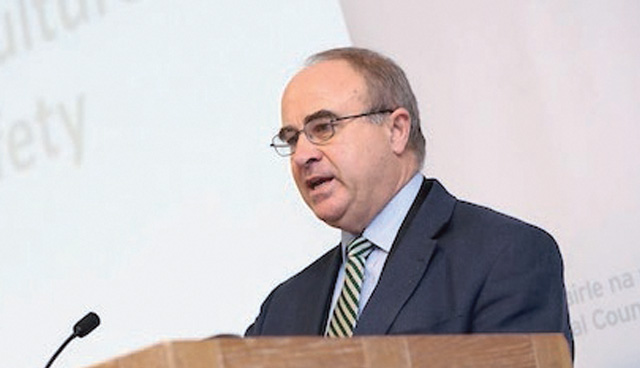Enhancing professional practice


The interest of the patient must be at the heart of all regulation in our health services, writes Bill Prasifka, CEO of the Medical Council. For the Medical Council, this is key and we see protecting patient interests as essential to creating an environment which enhances good professional practice among doctors.
Developing a fit-for-purpose regulatory framework is vital to the ongoing work of the Medical Council and we continue to work with our various stakeholders to ensure this critical objective is met.
This work is spearheaded by a number of key areas of activity:
- ensuring the highest standards of medical training and education through the evaluation and accreditation of undergraduate and postgraduate medical courses;
- promoting good medical practice;
- the development of professional competence schemes;
- maintaining the Register of Medical Practitioners; and
- investigating complaints against medical doctors and the Council’s Fitness to Practise processes.
Fitness to Practise tends to be the one that grab the headlines and while it is an essential aspect of the Council’s work, it remains a relatively limited part of what we do.
The enhancement of Professional Competence structures and the raising of standards of practice among medical practitioners has the potential to have the broadest, most long-term impact on the overall standard of healthcare delivered to the public. Continuing education and maintaining competence is where we enhance the true professionalism of doctors who are very committed to their patients and still highly respected in society.
But that respect and trust for doctors is primarily driven, in my view, by the vital role they play in advocating for their patients. When we hear about medical failures, the blame is firmly laid at the door of ‘the system’. If there is an issue in the health system, it is usually doctors, and indeed others working within it, who speak out and advocate on behalf of the patients they treat. For doctors, advocacy is a pivotal aspect of continuously raising standards in the profession and for patients.
When we look at some of the major healthcare failures around the world, a lack of advocacy can often be seen to exacerbate the problem. There are commonly longstanding issues which aren’t addressed, problems that are well known but not acted upon and management systems that aren’t properly functioning with little being done to improve them.
Doctors have a duty to put their patient first and their employer second which is not an easy obligation.
In an environment where resources are scarce, doctors in our health system face challenges in having to balance budgetary demands with the needs of their patients, which must come first.
The Medical Council, in its guidance to doctors, puts advocacy at the core and as a pivotal component of partnership in the patient doctor relationship. In the eighth edition of our Guide to Professional Conduct and Ethics for Registered Medical Practitioners, we advise that medical care must not be used as a tool of the State. By this we mean that doctors need to be free to make decisions in the best interests of their patients without political pressure. We expect politicians to make informed decisions about policy, but to allow doctors to implement that policy in a way that best serves their patients. Doctors must have every right to speak out without fear of consequences if they believe that decisions do not serve their patients. This is not to say that the views of healthcare managers and professionals necessarily differ, but that the single focus for all in our health system should be to deliver patient centred care. Advocacy is a fundamental facet of that and our thoughts should never stray from asking what is in the best interests of patients.
“We expect politicians to make informed decisions about policy, but to allow doctors to implement that policy in a way that best serves their patients. Doctors must have every right to speak out without fear of consequences…”
For all these reasons, it is imperative that the right doctors are in the right roles in the medical workforce. To aid this, the Medical Council has been collecting information from all registered doctors in Ireland on an annual basis, and collating it to produce the Medical Workforce Intelligence Report. This report enables us to share vital data on the make-up of the medical workforce to those who are instrumental in policy-making and planning, with the fundamental aim of ensuring safe, accessible and quality care to members of the public.
It is encouraging to see that the number of specialists on the register has increased over recent years, as we are all too aware of the doctor shortages we have experienced in the past months and years. With this valuable data, we have the power to share workforce intelligence with our stakeholders involved in healthcare planning in order to address these issues and deficiencies that have hindered our health system for too long.

The Medical Workforce Intelligence Report also complements the Your Training Counts Report, another annual report produced by the Council which focuses on the experience of trainee doctors in this country. The Your Training Counts collects data on all aspects of trainees’ experiences, including their long-term career intentions in terms of specialty choices, while the Medical Workforce Intelligence Report provides detailed intelligence on the proportions of doctors aged 55 and over by specialty, which enables planners and junior doctors to forecast where vacancies will soon arise.
In 2016, we had the highest number of doctors on the register ever. Although males continue to dominate the medical profession, there have been more Irish female graduates entering the medical profession than their male counterparts. The majority of those on the register between the ages of 30–44 are female; however, from 44 years and on the number of females on the register begins to decrease. 40 per cent of female trainees – or tomorrow’s specialists – want to work less than full-time and this definitely poses some questions for us all in the health sector and all of those involved in the future planning of Ireland’s healthcare service. It is vital we find ways to promote equality of opportunity and gender diversity across all levels within the profession in future years.
Protecting patient interests is essential to creating an environment which enhances good professional practice among doctors. By continuing to support and work with the profession we are fulfilling our role in promoting patient safety.
About the Medical Council
The Medical Council is a regulatory body which regulates medical doctors in the Republic of Ireland. The Council’s purpose is to protect the public by encouraging and better ensuring high standards of professional conduct and professional education, training and competence among doctors.
The Medical Council maintains the Register of Medical Practitioners – the register of all doctors who are legally permitted to carry out medical work in Ireland. There are over 21,000 doctors registered with the Medical Council. The Council also sets the standards for medical education and training in Ireland. It oversees lifelong learning and skills development throughout doctors’ professional careers through its professional competence requirements and is charged with safeguarding good medical practice.
The Medical Council is also where the public may make a complaint against a doctor. The Council has a membership of 25 including both elected and appointed members. The Council receives no State funding and is funded primarily by doctors’ registration fees.






